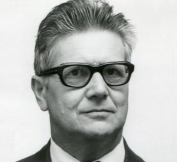Sándor Székely-Doby
As a junior engineer at Standard Villamossági Rt. (BHG), he also participated in the central design of the Magyar Posta apartment building. In his article on automatic calculators published in 1954, he argued that although electronic devices were the future, electromechanical calculators should be built in our country first. – However, he was dismissed from BHG due to his attitude in 1956.
As an unemployed person (for half a year), he contributed to the design of the BME electromechanical calculator; the machine was later named MESZ I by László Kozma. At the invitation of László Kalmár, he also gave a lecture on the construction of the calculator in Szeged in 1957, see below (this was the first lecture on the design of MESZ I, which contains irreplaceable details).
In the mid-1950s, he was Jenő Egerváry's graduate student on topics related to railway insurance systems. – Meanwhile, he helped László Kalmár a lot in the design of another domestically developed electromechanical calculator, the Szeged logic machine.
In 1960, he participated in the work of the preparatory committee for the first national long-term cybernetics research plan entitled "Development and Use of Cybernetics".
In 1965, he defended his PhD thesis entitled “Modern Railway Informatics Switching Technology”, among the first in this field. – Later, he also obtained a PhD degree at BME.
From 1968 he was a technical and economic expert at the Road-Railway Design Company (UVATERV). He established its Railway Telecommunications and Insurance Equipment Department as a new profile and, among other things, under his direction the design documentation for the telecommunications and insurance equipment of the 500 km long North African railway line was completed.
From the 1960s, he taught for a decade and a half at the Department of Mechanical Engineering and then Electrical Engineering Mathematics of the Budapest University of Technology (BME). He regularly gave lectures on technical and mathematical topics in scientific associations, conferences and at the Institute of Continuing Engineering Education. BME recognized his activities with the title of honorary associate professor.
From 1979, he was the head of the department of the Faculty of Automation of the then Technical College of Transport and Telecommunications (KTMF) in Győr. He invested a lot of energy in the modernization of education. He designed the railway laboratory; also the control equipment of the model railway system, which served the education of railway students for many years. – He has published numerous articles, studies and notes.
After his appointment as head of the department expired, he continued to participate in the educational work of the Department for many years, until 1993, where (in addition to his narrower field of expertise) he also did pioneering work in the teaching of computer-aided design methods. He continued to teach classes even after the Győr College became a university (Széchenyi István University, SZE); he also undertook to teach new subjects.
He was a member of the board of the Hungarian University and College Teachers' Association.
His teaching work was recognized with the Széchenyi Memorial Plaque and in 1994 with the János Apáczai Csere Award. BME awarded him an Iron Diploma in 2016.
- professional biography (2016, iron diploma)
- selected publications
- Sándor Székely-Doby: Self-operating controlled calculators
- Sándor Székely-Doby: Description of the relay calculator built at the Department of Wired Communications of the BME. Mathematical Papers IX. volume 1958. issues 1-2, BJMT, Budapest, p. 338.
- obituary (SZE)
- Family: 1 son and 3 grandchildren.
- In parallel with the University of Technology, he also studied music at the Academy of Music. He was an excellent pianist; he often gave piano recitals at the Győr College. He also studied composition; in his older years, he occasionally composed.
- He was a versatile, educated, and humorous personality. He never ran out of anecdotes, jokes, and interesting stories, which were always adapted to the given situation. He also happily shared his hobbies with his colleagues. He maintained close contact with his students outside of class; he actively participated in student events.
- Thanks to his high level of professional knowledge of French and German, he was able to establish close relationships with guests from foreign partner institutions in Győr.
- Even in his retirement years, he always tried to find new intellectual pursuits: he gave lectures on computer-assisted family tree research, bridge program development, and music notation programs (also knowing the ready-made programs available in these areas).
Created: 2021.03.24. 18:10
Last modified: 2024.05.17. 19:53

